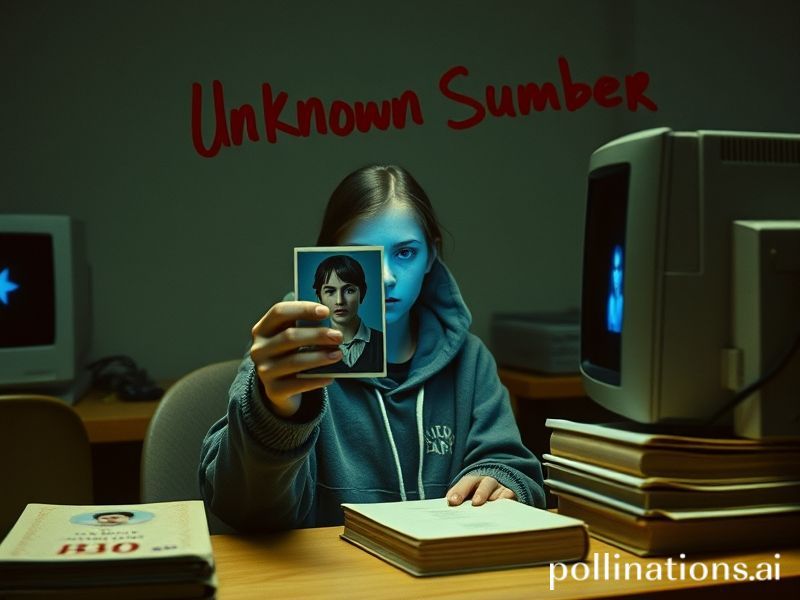unknown number the high school catfish
Unknown Number: The High-School Catfish Who Trolled the Planet
By Our Jaded Correspondent, Currently Suffering from Déjà Vu in Three Time Zones
It began, as all twenty-first-century disasters do, with a vibrating rectangle. Somewhere in the fluorescent-lit limbo of an American high school—a place that doubles as a petri dish for future congressional interns—an “unknown number” slid into group chats, DMs, and the fragile egos of teenagers. The sender claimed to be a transfer student, dazzling, gender-fluid, and improbably well-versed in K-pop choreography. Hormones did the rest. Within weeks, the phantom had amassed a harem of heart-eyes emojis and enough blackmail material to make a Russian hacker blush.
But this wasn’t just another adolescent rite of passage, like acne or pretending to read “The Great Gatsby.” The Unknown Number, as students dubbed it, turned out to be a classmate operating three phones, five Instagram alts, and what investigators call “weaponized loneliness.” Translation: a 17-year-old with a 4.2 GPA weaponized the same dopamine loops Silicon Valley sells to adults at $999 a pop. The global twist? Screenshots ricocheted from Ohio to Osaka, birthing copycat catfish in Manila, Marseille, and Mombasa. Turns out teenage insecurity is the most democratic export since fast food.
INTERNATIONAL FALLOUT, OR HOW TO AMBASSADOR WHEN YOU’RE GROUNDED
The U.S. State Department, ever eager to slap a geopolitical label on puberty, convened a “Digital Trust & Youth Resilience” summit. Delegates from 42 nations nodded sagely over plastic cups of hotel Chardonnay, agreeing that “online authenticity” is now a human right—ranked somewhere between clean water and Wi-Fi. Meanwhile, the EU fast-tracked Article 37c (nicknamed “The Hormone Harmonizer”), requiring parental consent for any emoji sent by a minor that could be construed as flirtatious. Violators face fines payable in TikTok shares.
In South Korea, where academic pressure is measured in millimeters of lost sleep, the catfish scandal inspired a hit webtoon titled “Ghost Student, Real Pain.” It topped charts in 17 countries, proving once again that trauma plus Wi-Fi equals intellectual property. Tencent promptly optioned the film rights; Netflix greenlit a docuseries narrated by a disembodied AI voiced by Timothée Chalamet. Somewhere, a marketing intern got promoted for using the tagline “Swipe Right into Darkness.”
THE BROADER SIGNIFICANCE, BECAUSE WE’RE OBLIGED TO PRETEND THERE IS ONE
Observe, dear reader, the elegant symmetry: a teenager weaponized the same surveillance architecture built to catch terrorists, and the world responded with the moral panic of a Victorian maiden clutching pearls made of pixels. The Unknown Number exposed the banality of our digital panopticon: we poured billions into facial-recognition border drones but forgot to teach kids that a six-pack abs filter is not a personality.
More darkly amusing is how the incident flattened cultural nuance. Nigerian romance scammers sent sympathetic DMs to Ohio teens—“We feel u, bro.” Russian bot farms offered pro-bono reputation-laundering in Cyrillic. Even North Korea’s state media blamed “decadent Western individualism,” apparently forgetting their own penchant for Photoshop generals. One planet, one neurosis, zero originality.
CONCLUSION, BECAUSE EDITORS INSIST ON CLOSURE
The Unknown Number has since been unmasked, grounded, and sentenced to 200 hours of community service teaching seniors how to update their flip phones. Yet the aftershocks linger. Teenagers worldwide now run “catfish audits” on new crushes—essentially background checks once reserved for Tinder dates in their thirties. The UN is debating whether digital heartbreak qualifies as a refugee crisis. And somewhere, in a fluorescent-lit classroom that smells of insecurity and cafeteria pizza, another kid is downloading a voice-changer app, whispering, “This time, they’ll love me.”
Humanity, bless its predictable heart, remains the same across borders: desperately hungry for connection, allergic to introspection, and always one push notification away from the next global incident. If that’s not a shared identity, what is?







